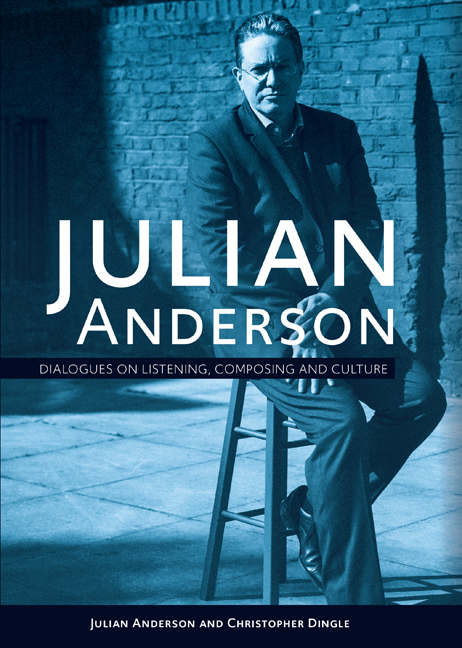Book contents
- Frontmatter
- Contents
- List of Illustrations
- Foreword
- Acknowledgements
- Introduction
- Prelude – Jeux: A Conversation Over Lunch
- Conversation One Origins
- Conversation Two Enthusiasms
- Conversation Three Training
- Conversation Four Dance
- Conversation Five Folk
- Conversation Six Composing (or Not)
- Conversation Seven Understandings
- Conversation Eight Beginnings (and Endings)
- Conversation Nine Puzzles
- Conversation Ten Singing
- Conversation Eleven Olly
- Conversation Twelve Memory
- Conversation Thirteen Opera
- Conversation Fourteen Practices
- Conversation Fifteen Outsiders?
- Conversation Sixteen Quartets
- Conversation Seventeen Advocacy
- Conversation Eighteen Partnerships
- Coda: Multiple Choices
- Chronology
- List of Personae
- Glossary of Musical Terms
- Macrotonality
- Catalogue of Published Works by Julian Anderson
- List of Recordings of Julian Anderson’s Music
- Bibliography
- Discography
- Index
Conversation Five - Folk
Published online by Cambridge University Press: 16 September 2020
- Frontmatter
- Contents
- List of Illustrations
- Foreword
- Acknowledgements
- Introduction
- Prelude – Jeux: A Conversation Over Lunch
- Conversation One Origins
- Conversation Two Enthusiasms
- Conversation Three Training
- Conversation Four Dance
- Conversation Five Folk
- Conversation Six Composing (or Not)
- Conversation Seven Understandings
- Conversation Eight Beginnings (and Endings)
- Conversation Nine Puzzles
- Conversation Ten Singing
- Conversation Eleven Olly
- Conversation Twelve Memory
- Conversation Thirteen Opera
- Conversation Fourteen Practices
- Conversation Fifteen Outsiders?
- Conversation Sixteen Quartets
- Conversation Seventeen Advocacy
- Conversation Eighteen Partnerships
- Coda: Multiple Choices
- Chronology
- List of Personae
- Glossary of Musical Terms
- Macrotonality
- Catalogue of Published Works by Julian Anderson
- List of Recordings of Julian Anderson’s Music
- Bibliography
- Discography
- Index
Summary
Folk naturally follows on from Dance, being similarly fundamental to Anderson's creativity. The link between dance and folk prompts reflection on the nature of community and society, as well as the loss of a common musical language. Questions of authorship are raised, before Anderson speaks of the seminal importance of Barrie Gavin's Bartók documentary The Miraculous Circumstance. The importance, or otherwise, of other folk traditions is explored along with the role of folk music in the works of Stravinsky and Bartók, and the extent to which the use of folk material resonates with audiences. The unfixed nature of folk music is the catalyst for a discussion on the revision of works.
CD: We’ve already spoken about how your love of dance came very early on. Folk music is also very important to you and, though not exclusively, a substantive amount of folk music and the associated traditions are also about dance.
JA: Yes. A lot of folk music is prompted by dance. In a lot of cases they happen simultaneously as a matter of course.
CD: Obviously it's a continuum, but the dance side of things in its physical manifestation is very much late-twentieth- and twenty-first-century modern contemporary Western dance, whereas folk explores much older traditions. That being the case, to what extent is there an overlap of dance and folk for you? I’m not thinking so much musically, but in terms of how you think of dance and folk together?
JA: I’ve never thought of it that way. It's very interesting you mention that because you’re quite right, of course, that in many cultures if you sing, you dance. I’d never thought of there being any relationship in my music as such, though there must be some because so many of my first published pieces were about dance, as we’ve said, and were about folk-dancing at that. Khorovod is an obvious case, The Stations of the Sun also, so clearly I’m aware of there being such a link, but I never thought of that consciously at all until you raised the question.
I suppose a lot of this though is to do with two related feelings of loss, which I’m aware of now. I wasn't aware of it that way when I got interested. One is the loss of community. I think that's widely felt.
- Type
- Chapter
- Information
- Julian AndersonDialogues on Listening, Composing and Culture, pp. 92 - 107Publisher: Boydell & BrewerPrint publication year: 2020



